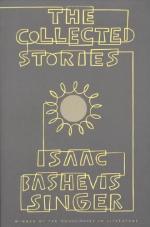|
This section contains 7,224 words (approx. 25 pages at 300 words per page) |

|
SOURCE: Sherman, Joseph. “Scrutinizing the Shtetl: I. B. Singer's ‘Tseytl un Rikl.’” Prooftexts 15, no. 2 (May 1995): 129-44.
In the following essay, Sherman examines Singer's short story “Tseytl un Rikl” in terms of its setting in a Jewish shtetl, the narrative monologue, and the themes of sin and virtue.
1
Among the many ambivalences that vitalize Singer's work is his treatment of the shtetl. In his Nobel Lecture (1978) he lauded it as “a great experiment in peace, in self-discipline, and in humanism,”1 yet, with few exceptions, in his fiction he vigorously interrogated its failure to demonstrate any of these qualities.2 Setting the ideal against the real, Singer measures divine potential against human incapacity. His skepticism recognizes that Revealed Truth, if it exists, can operate in this world only when fallible human will subordinates itself to infallible omniscience, a mode of living open only to those of perfect faith and complete humility...
|
This section contains 7,224 words (approx. 25 pages at 300 words per page) |

|


